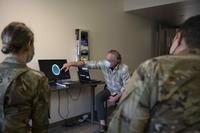The following is the House Armed Services Subcommittee for Military Personnel press release, which summarizes the subcommittee's proposals for the 2016 National Defense Authorization Act.
Subcommittee on Military Personnel Markup of FY16 NDAA
WASHINGTON - Led by Chairman Joe Heck (R-NV) and Ranking Member Susan Davis (D-CA), the Committee on Armed Services Subcommittee for Military Personnel today released their proposals for the Fiscal Year 2016 National Defense Authorization Act (NDAA). The Subcommittee will meet at 9:30 AM on Thursday, April 23rd in Rayburn 2212. The markup will be webcast on the committee’s YouTube page or at the HASC OpsCenter. The Military Personnel mark is available here: Subcommittee Mark.
The Military Personnel proposal is a vital part of the NDAA supporting and protecting our warfighters with the care and benefits they need, deserve, and have earned. Specifically, this year's proposal will:
Begin to reform the military retirement system to provide service members with a portable 401K-like benefit while retaining a defined retirement benefit at 20 years of service in an effort to help recruit and retain the best and the brightest in our Armed Forces and to ease their transition into civilian life.
Reject proposals that would have increased out-of-pocket costs for military families and reduced housing allowances and commissary benefits.
Continue vigorous oversight and reform of the military’s handling of sexual assault. This includes improvements to the Special Victims program, such as better training, performance measures, and standards; expansion of sexual assault prevention training to ROTC and Junior ROTC programs; and access to Special Victims Counsel for civilians who are victims of sexual assault. Requires DoD to enhance sexual assault prevention for male victims of the Armed Forces and to also develop a strategy to deal with retaliation against those who intervene on behalf of victims.
Take steps to help encourage remotely piloted aircraft pilots and submarine and nuclear officers to stay in service.
Support Military Health Care, including requiring DoD and the VA to establish a Joint Uniform Formulary to ensure Service Members have access to the medicines they need as they transition from Active Duty to ensure continuity of care. The proposal also prohibits the Secretary from restructuring Military Treatment Facilities until he reports on the methodologies used to identify facilities that will lose capacity. Also requires a GAO study on status of Army Warrior Transition Units and their effectiveness at delivering proper care.
Recommendations reflecting the Military Compensation and Retirement Modernization Commission’s Report
Joint military readiness is critical to our national security and that includes the ability to provide health and combat-casualty care for Service members. To help ensure the efficiency and effectiveness of this health care system, the proposal establishes a unified medical command with responsibility for overseeing all medical personnel, equipment and facilities across the Armed Forces.
To better support transition to civilian life and veteran employment, measure encourages more thorough collaboration between DoD and VA on transition assistance, job training, and post-placement services.
Supports robust commissary benefit, including a review of the Commission’s recommendations in this area, as well as the results of the independent contract study mandated in FY 15’s NDAA to look for efficiencies without reducing military family benefits.
Supports funding to promote and enhance Service members' financial literacy through a more robust financial training program.
Read more news on the 2016 NDAA and the Houses Pay and Compensation Recommendations on Military.com.
# # # #
Let your elected officials know your thoughts on the proposed plans for military benefits.



